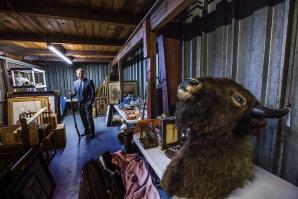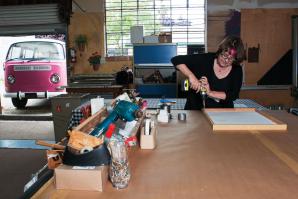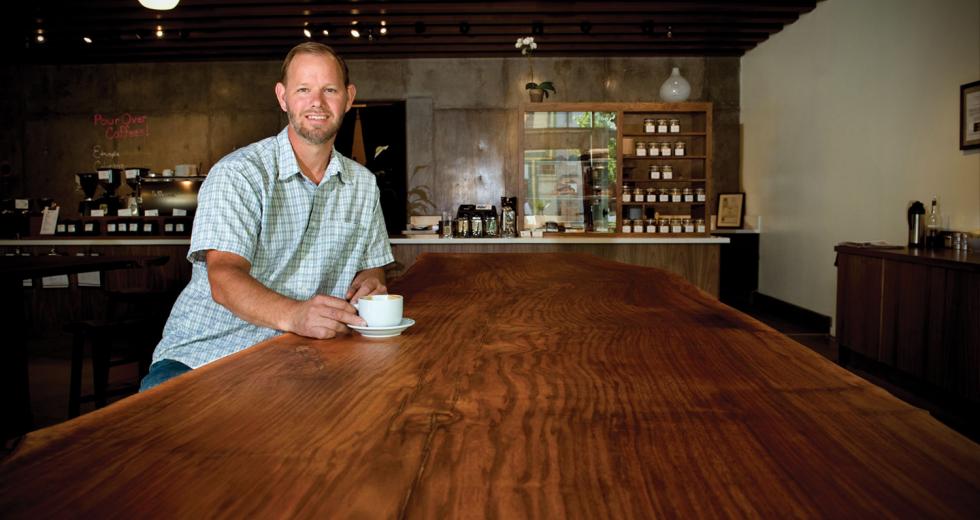Tree aficionado Clark Kayler rescues fallen elms, walnuts, sycamores and redwoods — giants that have lined the streets of midtown Sacramento for more than 100 years — and grants them new life in the form of furniture.
The massive claro walnut tables at Temple Coffee & Tea’s new location on 9th Street are a monument to his best friend and former business partner, Jonah Benkert, who died in 2008.
The pair stumbled into the business of making hardwood furniture in 2005 when Kayler spotted a man cutting down a huge redwood tree while renovating a Craftsman home in midtown Sacramento. Kayler was transfixed; there had to be a way to preserve the wood.
That day sparked the idea for New Helvetia Hardwoods. Kayler asked Benkert to help him find a mill that would cut the redwood into boards. The wood grain and texture was a work of art.
“I had never seen any furniture made of these wood slabs, but when we started cutting them, I felt I was seeing something special,” Kayler says. “It’s like tasting fine wine for the first time when all you had been drinking before was Milwaukee’s Best.”
Trolling Sacramento streets after storms and bargaining with tree contractors became the norm for Kayler and Benkert, who hunted old, felled trees to create their unique furniture. They bought a huge chainsaw and began stashing the cut slabs in friends’ yards to accommodate the wood’s four-year drying time.
Transforming the dead trees into dining tables, benches and coffee tables became a passion for Kayler and Benkert. The beauty and art-like nature of the wood was part of the legacy left by the trees that stood as sentries of Sacramento while they lived.
“Some of these big trees have been cleaning the air for 200 years, stabilizing the ground from erosion, providing us shade and beauty and a place for the animals to live,” Kayler says. “They are public art projects.”
He says Sacramento’s fallen trees can continue giving by becoming beautiful furniture that is passed from generation to generation and touts New Helvetia Hardwoods as a green alternative to mass-manufactured pieces constructed of plastic and particleboard.
“Everybody recognizes the beauty of these tables. They will keep them for hundreds of years,” says Kayler. “If you have one table from a tree like this, how many other disposable tables won’t be built over its lifetime?”
Dead and fallen trees often end up in a dump somewhere or are purchased by companies and shipped to the East Coast. The exhaust emitted from diesel trucks transporting these 15,000-pound trees thousands of miles erases all environmental benefits given by the trees during their lifetime, Kayler says.
Sacramento’s wealth of canopy trees prompted 40-year resident and downtown activist Al Alvarez to live in midtown. Although he is allergic to the elms, walnuts, sycamores and redwoods that shade his neighborhood, he sees them as natural resources whose benefits should stay local.
“In this economy, I don’t think we should be sending our trees to the other side of the country because someone wants to make a few bucks,” Alvarez says. “We could use these trees to employ local people who are out of work. We’re shipping out our trees and our jobs.”
Kayler says he wants to keep the city’s trees at home to make benches like those he created for B Street Theater and Azul Taqueria. The claro walnut tabletops at Temple Coffee are not only native Sacramentans, they are of a rare wood found only in Northern California and parts of Oregon.
Temple Coffee’s community tables came from a tree Kayler and Benkert found downtown. Kayler wanted the slabs to stay in Sacramento to memorialize his friend, whom he calls fearless, generous, risk-taking and the perfect partner for launching New Helvetia Hardwoods.
Those new community tables are definitely having an impact on regulars at Temple, says owner Sean Kohmescher. Customers constantly comment on their beauty, inquiring about the origin and requesting Kayler’s number in hopes of acquiring one for their homes, he says.
After a two-month search for huge pieces of walnut for the tables, Mark Welch, Temple’s carpenter, found New Helvetia Hardwoods and the special walnut Kayler was saving. Kohmescher wanted to provide big community tables at the new Temple shop, giving people the opportunity to chat with neighbors.
“We have seen the tables bring people together over great coffee, and that’s a beautiful thing,” says Kohmescher.
Kayler says he believes Sacramento’s grand trees draw city residents with their dignity and history. New Helvetia Hardwoods is his way of preserving the trees as works of art, as tributes to the greatness of the trees and the city.
“I feel I’m giving the trees a second time to bless us and contribute to mankind like they have so faithfully for hundreds of years,” Kayler says.
Recommended For You

Pricing the Past
Collector Brian Witherell on the gambles and gains of antiques
Juxtaposed against the crisp, modern lines of Brian Witherell’s home in Alkali Flat sits a trove of ancient treasures, premier antiquities cherry picked from his company’s massive antique collection.

Framed
The hand-carved Italian frame hanging in the back of Archival Framing is priced at $1,400. It surrounds a $10 plastic clock.



